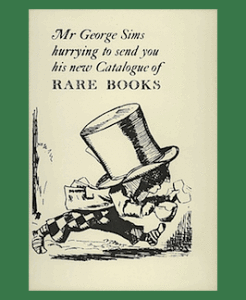 Found among papers at Jot HQ a typescript of a tribute by Anthony Rota to his fellow antiquarian bookseller George Sims at his memorial service in November 1999. Rota also wrote Sims’s obituary, which can be found on the Net.
Found among papers at Jot HQ a typescript of a tribute by Anthony Rota to his fellow antiquarian bookseller George Sims at his memorial service in November 1999. Rota also wrote Sims’s obituary, which can be found on the Net.
Many successful rare book dealers are interesting people—more interesting than, say your average auctioneer or art dealer. One thinks immediately of Eric Korn, who was a schoolmate of Jonathan Miller and Oliver Sacks, and who after giving up a Ph D on the biochemistry of snail hearts, became a bookseller almost by accident ( see previous Jot). Late in life he became an acclaimed columnist for the TLS and a fixture for many years on Round Britain Quiz. If Rota is to be believed George Sims was this sort of bookseller.
Born in 1923, he attended John Lyons School, Harrow. During the War he worked at Bletchley Park, liaising with a phantom signals unit behind enemy lines. After demobilisation he decided to become a bookseller and took a job at Frank Westwood’s shop in Harrow. After just nineteen months he was confident enough to set up on his own by taking up a room in his father’s house in Harrow, and in 1952 he upped sticks and moved to ‘ Peacocks’ a cottage in Hurst, Berkshire, where he died. Sims specialised in first editions, manuscripts and letters from the Victorian period to the present. According to Rota he was a ‘brilliant bookseller… whose catalogues have become as keenly sought after as the treasures that they contained’. He also published four volumes of memoirs, including The Rare Book Game (1985) and A Life in Catalogues (1994) that recount his adventures in the rare book and manuscript trade. His several volumes of poems were well received and his twelve novels, not all of which were set among the world of rare books, were admired by H.R.F. Keating, Evelyn Waugh and Roy Fuller. Sims befriended the surviving partner of the writer Llewellyn Powys, Alyse Gregory (see previous Jot) and Julian Symons, the poet, crime writer and admirer of Wyndham Lewis.
By all accounts, Sims was sometimes a difficult man to deal with. Rota noted that ‘he did not suffer fools gladly, indeed, it has been said of him that he refused to suffer them at all’. This is well illustrated in ‘A Collector’s Piece ‘the story he contributed to the Saturday Book in which a boastful collector is made to declare ‘I bought my first Shakespeare letter on July 1st 1954 ‘.
[R.M Healey]